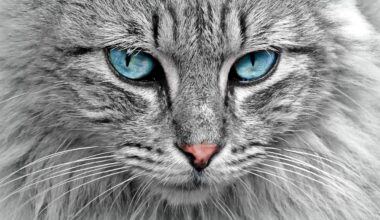Senior Cat Diabetes: Effective Home Care Strategies
Diabetes can be a challenging condition for senior cats, requiring careful management and understanding. Regular veterinary check-ups are essential to monitor your cat’s condition and adjust their treatment plan accordingly. You should also learn about the specific dietary needs that cater to diabetic cats. A high-protein, low-carbohydrate diet often helps manage their blood sugar levels effectively. Regular monitoring of their blood sugar levels at home is crucial. You can use a glucometer designed for cats and consult your veterinarian about how to interpret the readings. Keeping your cat’s environment stable and stress-free is essential for diabetes management as well. Stress can lead to fluctuations in their blood sugar levels, which might complicate their condition. Make sure to observe their behavior and adjust their routines accordingly. Ensure that they have a comfortable place to sleep and that their litter box is easily accessible. In addition, always ensure your cat is hydrated. Fresh water should always be available. You could also consider a pet water fountain; many cats love drinking from them and stay better hydrated!
Another vital strategy in managing diabetes in senior cats is the regular administration of insulin. Following the prescribed injection schedule diligently is crucial to controlling their blood sugar levels. It is best to administer insulin after meals to ensure optimal absorption and effectiveness. Additionally, try to establish a routine with feeding and insulin injection times to provide consistency, which can help stabilize their sugar levels. If you notice any signs of hypoglycemia, such as lethargy or weakness, having sugar gel or tablets on hand can be life-saving. Monitor your cat for any adverse reactions to the insulin itself, and report these to your veterinarian immediately. These could include excessive thirst, urination, or appetite changes. You might also want to prepare a logbook for tracking your cat’s food intake, insulin doses, and any behavioral changes. This log helps you and your veterinarian make informed decisions regarding your cat’s care plan. Engage in some regular, gentle play with your cat; it helps manage their weight and encourages healthy activity levels. Always consult your veterinarian before introducing new activities or dietary changes!
Understanding Cat Diabetes Symptoms
Recognizing the symptoms of diabetes in senior cats can help you manage their health better. Common indicators include excessive thirst, frequent urination, weight loss, and increased appetite. Make it a habit to monitor these signs closely. If you notice a sudden change in behavior, it’s essential to consult your veterinarian immediately. Understanding these signs can help prevent complications and ensure timely interventions. Being observant not only enables you to react swiftly but also enriches the bond you share with your furry friend. Early detection often results in improved management of their diabetes, allowing for a better quality of life. Additionally, best practices include monitoring their litter box habits closely. A diabetic cat may urinate more often and in larger amounts. Keep an eye on their drinking habits as well; they may drink more water than usual if they are unwell. Keep a diary to log observations and share this valuable information during veterinary visits. It helps the vet assess changes in their condition more effectively. Regular updates to your vet will improve the care plan and outcome of managing your cat’s diabetes.
Another aspect to consider is the importance of dental care for senior cats with diabetes. Oral health issues can lead to complications, including infections that worsen diabetic conditions. Regular brushing or professional dental cleanings are recommended to prevent plaque buildup and periodontal diseases. Ensure to use pet-safe toothpaste and dental products to support their oral hygiene. Regular dental check-ups can help identify any potential problems early on. Make sure to monitor their eating habits as well. Changes in their eating can indicate discomfort or pain, potentially associated with dental issues. Always provide food that caters to their diabetic needs and takes into consideration any preferences they have developed over time. Additionally, discuss with your veterinarian any further dietary requirements based on your cat’s health status. If your cat is reluctant to eat or shows changes in appetite, no matter how slight, it’s vital to reach out to your veterinarian. They can recommend suitable food alternatives or supplements, ensuring your beloved cat remains nourished and healthy while managing their diabetes effectively.
Creating a Comfortable Environment
Establishing a comfortable and safe environment for senior cats with diabetes can significantly affect their wellbeing. Cats are sensitive to their surroundings, and a peaceful space can help reduce stress, which is critical for managing diabetes effectively. Ensure that they have a designated area in your home where they feel safe and can easily access essentials such as food, water, and litter. High-sided litter boxes may be necessary if your cat has mobility issues. Ensure that their bedding is cozy and accessible, providing a soft place for them to rest without disturbances. Avoid placing their essentials in noisy or high-traffic areas of your home. You can create a calming atmosphere by providing hides, as cats love to burrow. Regularly cleaning their environment helps ensure a hygienic space free of allergens that could lead to further health issues. It’s also beneficial to provide gentle stimulation, like soft toys or safe climbing structures, to encourage mild exercise and mental engagement. Having a predictable daily routine adds to the comfort; cats thrive on consistency, which can help maintain steady blood glucose levels.
Engaging in regular communication with your veterinarian helps ensure your senior cat with diabetes receives optimal care. Veterinary visits should be regular and thorough to monitor your cat’s progress. Discuss any changing symptoms, so treatment plans can be adjusted when necessary. Furthermore, learning about potential complications associated with diabetes can also be beneficial. These might include urinary tract infections or pancreatitis, so staying informed helps them spot problems early. Attend to your cat’s diet and behavior; any changes warrant further investigation. This partnership fosters better care and proactive management of your senior cat’s diabetes. Additionally, consider joining a pet health community for sharing experiences and gaining insights from others in similar situations. A support network can offer emotional support, share tips, and provide knowledge on managing diabetes in senior cats. Check for online forums or local support groups focused on pet care. Lastly, make sure to stay educated about the latest advancements in pet diabetes management practices and treatments. This ongoing learning empowers you as a pet owner!
Conclusion and Continued Care
In conclusion, managing senior cat diabetes at home requires a multi-faceted approach. From monitoring blood sugar levels and adhering to insulin schedules to providing a healthy diet and stimulating environment, every element counts. Observing your cat’s behavior, keeping records, and ensuring regular veterinary check-ups are vital. Your commitment to your cat’s care is instrumental in offering them a fulfilling, happy life despite their diabetes. Fostering a comfort-focused space reduces stress and helps regulate their sugar levels. In addition, dental health plays a significant role in their overall well-being, so neglecting it could lead to larger health problems. Emphasize gentle engagement and stimulation through play while ensuring their physical comfort. This multifaceted approach not only addresses the physical needs of your diabetic cat but also enriches their emotional health. Always remember to reach out to your veterinarian when in doubt or when facing challenges with care. They can offer professional advice tailored to your situation. With proper attention and care, senior cats with diabetes can enjoy many happy moments, providing you joy and companionship while managing their health.


